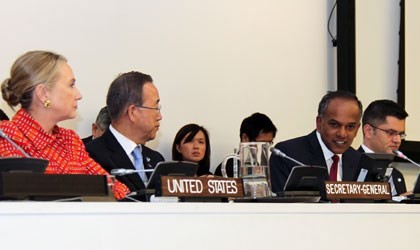1. It is my pleasure to welcome
o Secretary-General of the United Nations, His Excellency Mr Ban Ki-moon,
o President of the General Assembly, His Excellency Mr Vuk Jeremić,
o US Secretary of State, Her Excellency Hillary Clinton
o And other participants
to the inaugural FOSS Conference on Small States.
1. Also - warm welcome to Belarus, Serbia, Hungary and Liberia
o Our newest members to FOSS.
o Brings our total membership to 105
2. Happy to note:
o President Jeremić is from a FOSS member state
o As were the ten Presidents of the General Assembly before him
o Reflects the increasing prominence and impact of small states in multilateral and international affairs.
o FOSS has helped contribute to this.
BACKGROUND OF FOSS
3. 20 years ago, Singapore recognised potential in creating a distinct constituency of small states.
o We were grappling with the challenges that all small states face in international forums.
o Our then-Permanent Representative, Ambassador Chew Tai Soo, worked closely with the Permanent Representatives of countries like Bahrain, Barbados, Cape Verde, Djibouti, Papua New Guinea and Uruguay to launch FOSS.
o We are happy to have Amb Chew present here today – can I ask him to stand up.
4. FOSS had two founding principles, which are still upheld:
o One, inclusivity:
The criteria for membership was population (10 million and below) rather than physical size.
Once admitted, no member would be “graduated” or asked to leave.
o Two, informality:
FOSS membership would not contradict existing regional or other group affiliations.
There would be no formal structure or decision-making authority.
In addition, no membership dues.
The only commitment - to attend FOSS meetings as diligently as possible and to participate in the discussions.
KEY ACHIEVEMENTS OF FOSS
5. Not easy – for any grouping in the UN to survive for 20 years.
6. On the occasion of our 20th anniversary - take stock of what FOSS has achieved.
7. Let me highlight two broad points.
8. One, FOSS has helped our members overcome some of the operational challenges small states face in the UN.
o FOSS provides a platform for members to share and learn from each other’s experiences.
o It regularly invites prominent academics, strategic thinkers, political leaders, key UN officials and senior diplomats, from FOSS and non-FOSS members, to address the forum.
o In so doing – helped small states better understand key issues of the day. This has proved extremely useful for small states with lmited resources. From a broader perspective – helps in the broader functioning of the UN
9. Two, FOSS has become a significant grouping in the UN for anyone wanting to canvass for candidature support:
o FOSS was originally established for small states to support one another in candidatures – and has been effective in that context.
o This remains the position. Today, even non-FOSS members regard FOSS as a valuable platform and have addressed the forum to canvass support from its members – FOSS has 105 members.
o Secretary-General Ban spoke to FOSS when he was running for the post of UN Secretary-General in 2006, and also when he was seeking re-appointment in 2011.
10. Membership of FOSS does not contradict existing regional or other group affiliations.
o Members can explain and discuss the positions of their respective groupings
o Facilitate greater mutual understanding
o But FOSS does not take common negotiating positions
o Discussions at FOSS events contribute to the forging of consensus outside of the forum.
11. Working together allows us to speak with a stronger voice.
THE ROAD AHEAD
12. These achievements form the foundation for FOSS’ continued efforts in helping small states
o To not only survive;
o But to also play a useful role in the international arena in the years ahead.
13. Many of the small states have been successful despite our size and constraints.
o We understand what it means to be small and we approach issues realistically
o Keen awareness of the external environment
14. These qualities will allow small states to play thought leadership
15. FOSS can help facilitate intellectual leadership by small states.
o I hope that today’s conference can help catalyse ideas on the areas in which small states can contribute –
o In global affairs, multilateral diplomacy, international security and development issues.
THE DAY’S PROCEEDINGS
16. This morning, we have the honour to hear addresses from
o Secretary-General Ban
o President of the General Assembly Jeremić,
o US Secretary of State Hillary Clinton.
17. This will be followed by a panel discussion on the role that small states can play in international relations.
18. We will have a working lunch featuring a keynote address by former President of Finland and Nobel Peace Prize laureate H.E. Martti Ahtisaari
19. And a second panel discussion in the afternoon on how small states overcome challenges and constraints in their drive to development.
o The session will open with a keynote address by the Prime Minister of Bhutan, His Excellency Jigmi Thinley.
20. After the Conference, a compilation of statements made today and a summary of the discussions will be circulated as a UN document.
21. I wish everyone a constructive and useful experience at the conference.
22. I now have the honour and pleasure of inviting Secretary-General Ban Ki-moon to deliver the Opening Address.
. . . . .

 [Photo: MFA]
[Photo: MFA]